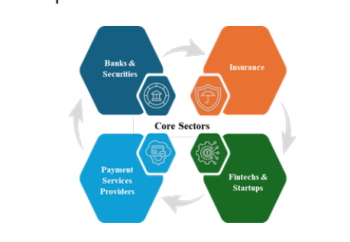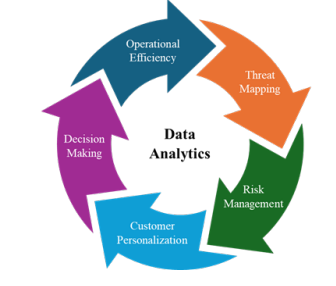
Transformative Power of Data Analytics in Financial Sector
Information is the oil of the 21st century, and analytics is the combustion engine.
By Peter Sondergaard
Data Analytics – An innovative technique
Data feelings or assumptions. Through techniques like data visualization, predictive analytics, machine learning, and statistical modeling, organizations can identify trends and patterns, optimize operational efficiency, enhance customer experiences, improve risk management and drive innovation and strategic growth.
Data Analytics impact on the Financial Industry
Navigating risk is a fundamental aspect of the finance industry. Whether in banking, FinTech, Investment firms, Payment Service Providers, or Insurance companies, assessing market risks is crucial before offering products or services to the clients. These core industry players are at the forefront of adopting innovative solutions and are increasingly leveraging data analytics techniques.

Data analytics tools have revolutionized the way data is understood and managed by enabling faster, more accurate, and data-driven risk assessments of vast amounts of information. With precise segmentation and detailed visualization, industry players can make well-informed decisions and strategically align their business objectives. Here’s a closer look at how data analytics is transforming the financial sector:
Improved Decision Making: By analyzing large volumes of data, financial institutions can gain deeper insights into market trends, customer behavior, and market risks. This enables more informed decision-making and enhances the ability to forecast financial outcomes.
Risk Management: Data analytics allows financial organizations to assess risks more accurately by analyzing patterns in historical data and market trends. This can help with identifying potential threats such as fraud, market downturns, or credit defaults, improving overall risk management strategies.
Customer Personalization: Financial institutions or related service providers can use data analytics to understand customer preferences, behaviors, customers spending patterns and financial needs. This allows for personalized offerings, tailored investment advice or customized solutions, products and services, improving customer satisfaction, experience and loyalty.

Operational Efficiency: By leveraging automation and data-driven insights, financial institutions can streamline operations, reduce costs, claim processing, GAP analysis and enhance the efficiency of internal processes like compliance monitoring, transaction processing, and fraud detection.
Regulatory Compliance: Data analytics aids in maintaining compliance with financial regulations by automating data collection, reporting, and auditing. It can also help detect irregularities or anomalies that could indicate non-compliance or fraud.
Innovation in Products and Services: Financial institutions can develop new, data-driven products
and services by identify gaps in the market and cater to the specific customer needs.
Market Analysis and Investment Strategies: Using advanced data analytics tools, financial analysts and portfolio managers can pinpoint lucrative investment opportunities, assess market conditions, and adapt strategies to align with the institution’s overarching financial objectives.
The finance industry has always been driven by data, and the ability to effectively manage vast and complex information, is crucial to unlocking its full potential. To harness the power of data analytics, it is essential to use the right analytical tools for the right segments. Leading tools such as Power BI, Tableau, and QlikView enable data visualization and are highly effective in creating interactive reports and dashboards that can be seamlessly embedded and accessed across various devices and platforms. As technological disruptions continue to reshape the industry, managing information and leveraging automated decision-making will become essential in the coming era. Now is the perfect time to embark on this transformation journey and stay ahead in an ever-evolving landscape.
An Article from SimplyFI Consulting WLL
www.simplyfi.me




